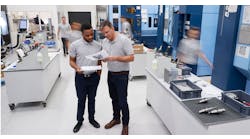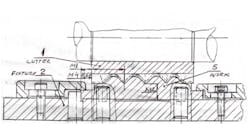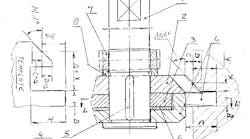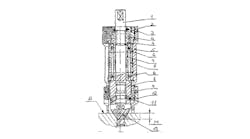A coat of paint can make an old machine look new again, and two common types of paint that shops use are one-part alkyd enamel or two-part epoxy/urethane. One-part alkyd enamels are tough, easy to prep for and touch up if needed, while two-part epoxies/urethanes provide long-term protection, but involve mixing.
When using one-part alkyd paints, shops usually do not need to take a machine down to bare metal if there is no flaking or peeling. But it is critical to degrease and sand the surface to be painted.
Shops can brush on these enamels because they leave minimal brush marks and clean up with mineral spirits. Some popular brands include Rustoleum Hammered, Ace Hardware Rust Stop and ICI/Dulux industrial alkyd enamels. One shop owner reports that Rustoleum Hammered in a spray can seems a bit thin, and he recommends mixing
quarts of black and silver to get a machine-gray color. Alkyd enamels are like concrete: they do not dry but harden (cross link). Their solvents evaporate sufficiently enough on the first day that surfaces are tacky under pressure. After about a week, the paint becomes real hard, and in a couple of years, nothing but mechanical means will remove it.
Curing is the key difference between enamels and air-dry paints such as lacquers. But there is curing, and then there is curing. Some curing processes form polymers that are cross-linked, so each polymer molecule is linked with several others to form a lattice or matrix. The polymers that are highly crosslinked provide strong resistance to chemical attack and mechanical harm. Such enamels can be found at a Sherwin-Williams Industrial store, says one shop owner.
Another type of curing involves adding enamel hardeners to alkyd enamel paints to enhance gloss and hardness and, in some instances, improve chemical resistance. Once hardeners are added, paint has only a few hours of pot life: it will harden in the can. Once on a machine, the paint basically cures, not dries.
Extreme caution is required when working with enamel hardeners because most contain isocyanate compounds that can cause immediate allergic reactions in some people and reactions in others following regular exposure. Apparently, symptoms mimic a heart attack.
Reportedly, 3M's 7192 Organic Vapor mask is designed specifically for isocyanates, and it costs about $14.00 at most on-line paint stores. Also, users should wear an impermeable spray suit. These do not include suits made of cotton because this fiber allows isocyanates to pass through and be absorbed by the human skin.
Most shops agree that two-part epoxy/urethane paints provide better long-term performance as compared with enamels. Some shops prep machines with a two-part primer and then apply a two-part urethane. But, like hardeners, some urethanes contain isocyanates, so a positive air respirator should be used.
However, there are several twopart epoxy primers and paints that contain isocyanate-free hardeners. Dupont, PPG and several other companies offer such paints.
Two-part epoxies typically have pulverized glass/silica for greater scratch resistance, and they are high building, meaning they quickly fill/level cast surfaces. A little practice is needed before these paints are actually applied to a machine.



